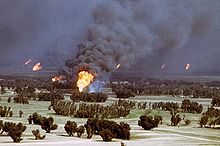
Back الأثر البيئي للحرب Arabic Effaith rhyfel ar yr amgylchedd CY Impacto ambiental de la guerra Spanish پیامد زیستمحیطی جنگ FA Impact environnemental de la guerre French Tasirin muhalli na Yaki HA Dampak perang terhadap lingkungan ID Mmetụta agha na gburugburu ebe obibi IG Impatto ambientale della guerra Italian 전쟁이 환경에 미치는 영향 Korean


| Part of a series on |
| Pollution |
|---|
 |
Study of the environmental impact of war focuses on the modernization of warfare and its increasing effects on the environment. Scorched earth methods have been used for much of recorded history. However, the methods of modern warfare cause far greater devastation on the environment. The progression of warfare from chemical weapons to nuclear weapons has increasingly created stress on ecosystems and the environment. The military sector is responsible for around 5.5% of global GHG emissions (not including emissions from the conflicts themself), which are not included in GHG assesments on global and country level.[1] Specific examples of the environmental impact of war include World War I, World War II, the Vietnam War, the Rwandan Civil War, the Kosovo War, the Gulf War, and the 2022 Russian invasion of Ukraine.